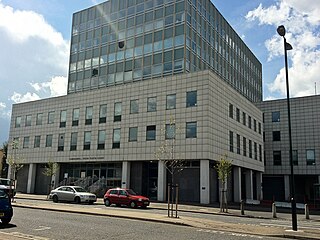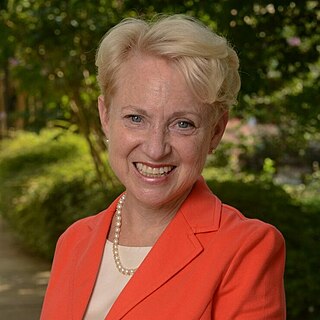
In criminal justice, particularly in North America, correction, corrections, and correctional, are umbrella terms describing a variety of functions typically carried out by government agencies, and involving the punishment, treatment, and supervision of persons who have been convicted of crimes. These functions commonly include imprisonment, parole, and probation. A typical correctional institution is a prison. A correctional system, also known as a penal system, thus refers to a network of agencies that administer a jurisdiction's prisons, and community-based programs like parole, and probation boards. This system is part of the larger criminal justice system, which additionally includes police, prosecution and courts. Jurisdictions throughout Canada and the US have ministries or departments, respectively, of corrections, correctional services, or similarly-named agencies.

Juvenile delinquency, also known as juvenile offending, is the act of participating in unlawful behavior as a minor or individual younger than the statutory age of majority. These acts would be considered crimes if the individuals committing them were older. The term delinquent usually refers to juvenile delinquency, and is also generalised to refer to a young person who behaves an unacceptable way.
Probation in criminal law is a period of supervision over an offender, ordered by the court often in lieu of incarceration. In some jurisdictions, the term probation applies only to community sentences, such as suspended sentences. In others, probation also includes supervision of those conditionally released from prison on parole. An offender on probation is ordered to follow certain conditions set forth by the court, often under the supervision of a probation officer. During the period of probation, an offender faces the threat of being incarcerated if found breaking the rules set by the court or probation officer.

A probation or parole officer is an official appointed or sworn to investigate, report on, and supervise the conduct of convicted offenders on probation or those released from incarceration to community supervision such as parole. Most probation and parole officers are employed by the government of the jurisdiction in which they operate, although some are employed by private companies that provide contracted services to the government.

Juvenile court, also known as young offender's court or children's court, is a tribunal having special authority to pass judgements for crimes committed by children who have not attained the age of majority. In most modern legal systems, children who commit a crime are treated differently from legal adults who have committed the same offense. Juveniles have a lack of capacity for understanding their criminal acts, meaning they also have diminished criminal responsibility compared to their adult counterparts. In some states like California and Georgia, the Juvenile Court may also have jurisdiction over juvenile dependency cases which involve determining whether a child has been abused, abandoned, or neglected by their parent or legal guardian.
The U.S. Probation and Pretrial Services System, also called the Office of Probation and Pretrial Services, part of the Administrative Office of the United States Courts, is the probation office of the federal judiciary of the United States. It serves the United States district courts in all 94 federal judicial districts nationwide and constitutes the community corrections arm of the Federal Judiciary. It administers probation and supervised release under United States federal law enforced by probation officers.

The American juvenile justice system is the primary system used to handle minors who are convicted of criminal offenses. The system is composed of a federal and many separate state, territorial, and local jurisdictions, with states and the federal government sharing sovereign police power under the common authority of the United States Constitution. The juvenile justice system intervenes in delinquent behavior through police, court, and correctional involvement, with the goal of rehabilitation. Youth and their guardians can face a variety of consequences including probation, community service, youth court, youth incarceration and alternative schooling. The juvenile justice system, similar to the adult system, operates from a belief that intervening early in delinquent behavior will deter adolescents from engaging in criminal behavior as adults.
The child-saving movement emerged in the United States during the nineteenth century and influenced the development of the juvenile justice system. Child savers stressed the value of redemption and prevention through early identification of deviance and intervention in the form of education and training.
Juvenile delinquency in the United States refers to crimes committed by children or young people, particularly those under the age of eighteen.

The United States incarcerates more of its youth than any other country in the world, through the juvenile courts and the adult criminal justice system, which reflects the larger trends in incarceration practices in the United States. In 2010, approximately 70,800 juveniles were incarcerated in youth detention facilities alone. As of 2006, approximately 500,000 youth were brought to detention centers in a given year. This data does not reflect juveniles tried as adults. As of 2013, around 40% were incarcerated in privatized, for-profit facilities.
Private probation is the contracting of probation, including rehabilitative services and supervision, to private agencies. These include non-profit organizations and for-profit programs. The Salvation Army's misdemeanor probation services initiated in 1975, condoned by the state of Florida, is considered to be among the first private probation services. The private probation industry grew in 1992, when "local and county courts began outsourcing misdemeanor probation cases to private companies to alleviate pressure on overburdened state probation officers."

Incarceration prevention refers to a variety of methods aimed at reducing prison populations and costs while fostering enhanced social structures. Due to the nature of incarceration in the United States today caused by issues leading to increased incarceration rates, there are methods aimed at preventing the incarceration of at-risk populations.

Gender responsive approach for girls in the juvenile justice system represents an emerging trend in communities and courts throughout the United States, Australia and Latin America, as an increasing number of girls are entering the juvenile justice system. A gender responsive approach within the juvenile justice system emphasizes considering the unique circumstances and needs of females when designing juvenile justice system structures, policies, and procedures.

The Public Defender Service (PDS) for the District of Columbia provides legal defense to individuals on a court-appointed basis for criminal and delinquency cases indigent adult and juvenile defendants/ respondents. Its Mental Health Division provides representation to persons facing involuntary civil commitment based on allegations that the person is a danger to self or others as a result of mental illness. Its parole division represents parolees charged with violating parole and facing revocation before the United States Parole Commission. PDS also provides other legal-related services in DC.

Criminal justice reform seeks to address structural issues in criminal justice systems such as racial profiling, police brutality, overcriminalization, mass incarceration, and recidivism. Reforms can take place at any point where the criminal justice system intervenes in citizens’ lives, including lawmaking, policing, sentencing and incarceration. Criminal justice reform can also address the collateral consequences of conviction, including disenfranchisement or lack of access to housing or employment, that may restrict the rights of individuals with criminal records.
The CUNY Institute for State and Local Governance (ISLG) is a research and policy organization based out of City University of New York. ISLG was founded in 2013 by Michael P. Jacobson, a former President of the Vera Institute of Justice and veteran government official under the Dinkins and Giuliani administrations in New York City.
The Georgia Council on Criminal Justice Reform is a fifteen-member, non-partisan state commission tasked with conducting annual comprehensive reviews of criminal laws, criminal procedure, sentencing laws, adult correctional issues, juvenile justice issues, enhancement of probation and parole supervision, better management of the prison population and of the population in the custody of the Department of Juvenile Justice, and other issues relates to criminal proceedings and accountability courts in the state of Georgia.

The Commission on Crime Prevention and Criminal Justice (CCPCJ) is a functional commission of the United Nations Economic and Social Council (ECOSOC) based in Vienna. The commission serves as the primary organ that guides the activities of the United Nations in the fields of crime prevention and criminal justice.

The Ghanaian juvenile justice system encompasses the processes to handle minors who are in conflict with the law or who are in need of care and protection. The formal Ghanaian juvenile justice system was created under colonial rule and has evolved greatly since the early 1900s. Three stark changes for the system are throughout the colonial period, the beginnings of independence and the 1960 Criminal Procedure Code, and the newest Juvenile Justice Act.

Laurie Robinson is an American scholar and public servant who has held multiple positions across government, academia, and the nonprofit sector. Robinson's most notable roles include serving as Assistant Attorney General in charge of the U.S. Department of Justice Office of Justice Programs under former Presidents Bill Clinton and Barack Obama, and co-chairing Obama's Task Force on 21st Century Policing. She also served on the congressionally created Charles Colson Task Force on Federal Corrections and on an independent commission that explored the potential closure of New York City's Rikers Island jail complex. Most recently, Robinson served as founding Chair of the Board of Directors of the Council on Criminal Justice, a nonpartisan policy and research organization.










